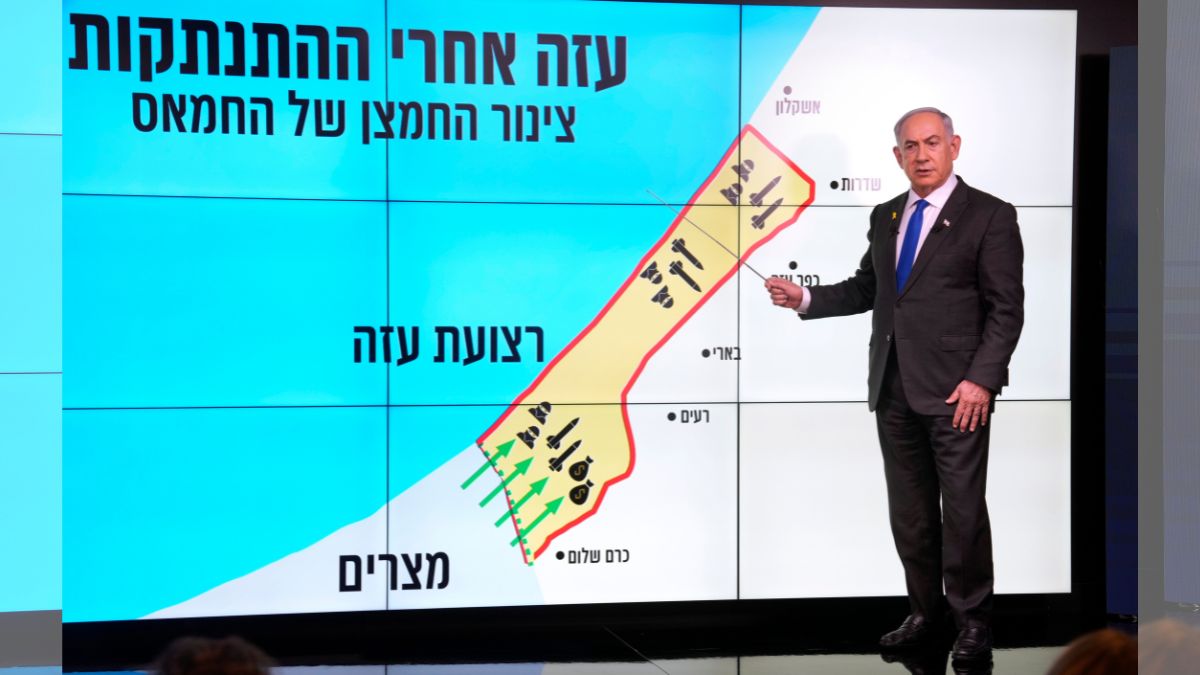Israeli Prime Minister Benjamin Netanyahu has continuously put a spotlight on the importance of maintaining Israeli control over the Philadelphi Corridor, a narrow strip of land along Gaza’s border with Egypt.
This corridor, he asserts, is crucial to preventing Hamas from rearming, stating, “This is the oxygen of Hamas.” The demand for continued Israeli oversight of this area has become a pivotal point of contention in ongoing negotiations, particularly in relation to the release of hostages held by Hamas.
What is the Philadelphi Corridor?
The Philadelphi Corridor, also known as the Philadelphi Route, is a 14-kilometre (8.7-mile) long and 100-meter wide strip of land that runs the entire length of the Gaza-Egypt border.
Established as part of the 1979 Israel-Egypt peace treaty, its primary function was to act as a buffer zone, preventing the smuggling of weapons and unauthorised movement of people between Gaza and Egypt. Initially controlled by Israeli forces, this corridor became a focal point in Israel’s security strategy after its withdrawal from the Sinai Peninsula.
In 2005, as part of Israel’s unilateral disengagement from Gaza, Israeli forces withdrew from the corridor, passing control to Egypt and the Palestinian Authority under the Philadelphi Accord.
Impact Shorts
More ShortsThis accord allowed Egypt to deploy 750 soldiers to patrol its side of the corridor. However, when Hamas took control of Gaza in 2007, the security dynamics shifted dramatically.
Smuggling tunnels proliferated under the corridor, and while Egypt claimed to be actively destroying these tunnels, Israel remained sceptical of Cairo’s effectiveness. Netanyahu’s recent demand to retain control over this corridor is based on concerns that without Israeli oversight, Hamas would continue to smuggle weapons, posing a severe threat to Israeli security.
What is Egypt’s role in the Philadelphi Corridor?
Egypt’s involvement in the Philadelphi Corridor is rooted in its historical role as a guarantor of the peace treaty with Israel. However, the rise of Hamas in Gaza has complicated Egypt’s position.
Egyptian President Abdel Fattah el-Sisi has repeatedly stated that Egypt will not allow Palestinians to be displaced into Egyptian territory, a concern that has grown amid Israel’s demands to reoccupy the corridor.
The Rafah crossing, located within the corridor, remains the only passage between Gaza and Egypt, and by extension, the outside world, that is not under Israeli control. This crossing has become increasingly important during the ongoing conflict, serving as a critical conduit for humanitarian aid.
Also Read: Will Israel’s biggest protests mark the end of Benjamin Netanyahu’s rule?
Despite these concerns, reports indicate that Egypt might consider allowing an Israeli security presence along the corridor, provided that it does not involve permanent military occupation.
One proposed compromise includes the establishment of an underground barrier and electronic monitoring, with occasional patrols. However, such arrangements would require the approval of Palestinian factions, particularly Hamas.
What about the Netzarim Corridor?
While the Philadelphi Corridor garners much of the attention, Israel has also focused on the Netzarim Corridor, an 8-kilometre (5-mile) stretch of land within Gaza that connects Gaza City to central Gaza.
Named after the former Israeli settlement of Netzarim, this corridor has become strategically significant for Israel’s military operations, especially in isolating northern Gaza. The Netzarim Corridor has allowed Israel to divide Gaza, limiting movement and making it easier to target Hamas positions.
Israel’s control over this corridor has also facilitated the establishment of military bases that enhance its ability to monitor and control the flow of goods into Gaza, further tightening the blockade. Like the Philadelphi Corridor, the Netzarim Corridor has become a non-negotiable aspect of Israel’s security demands in ongoing talks with Hamas.
How have these corridors impacted peace negotiations?
Netanyahu’s insistence on maintaining control over these corridors has complicated negotiations for a ceasefire and the release of hostages. Hamas has offered to release all hostages in exchange for the complete withdrawal of Israeli forces, the end of the war, and the release of Palestinian prisoners.
However, Israel’s demands, particularly regarding the Philadelphi Corridor, have become major sticking points.
This deadlock has also exposed divisions within the Israeli government. Reports suggest that Israeli Defence Minister Yoav Gallant has clashed with Netanyahu over the prime minister’s prioritisation of border control over the lives of hostages. Gallant has argued that the focus should be on securing the hostages’ release, even if it means compromising on control of the corridors.
Despite this, Netanyahu has remained firm, with an official confirming that during a recent security cabinet meeting, Gallant was the lone vote against maintaining control over the Philadelphi Corridor, reported AP. “No one is more committed to freeing the hostages than me…No one will preach to me on this issue," Netanyahu declared.
Hamas and Egypt have both strongly opposed Israel’s reoccupation of the corridor. Khalil al-Hayya, a senior Hamas official, criticised Netanyahu’s stance, telling Al Jazeera that the prime minister considers the corridor “more important” than securing the release of hostages.
Egyptian officials have similarly expressed concerns that Israel’s demands could lead to a broader regional conflict, particularly if it involves permanent military presence.
With inputs from agencies
Anmol is a Senior Sub-Editor with Firstpost. He likes to cover stories that intrigue him, generally revolving around international polity, Indian foreign policy, human interest, environment and even the politically-charged election cycles in India. He has far too many disparate interests with a constant itch for travel. Having visited fourteen states in the Indian subcontinent, he is always on the lookout for opportunities to add more to the list. He enjoys watching Football, Tennis and F1 purely as a sports enthusiast.
)